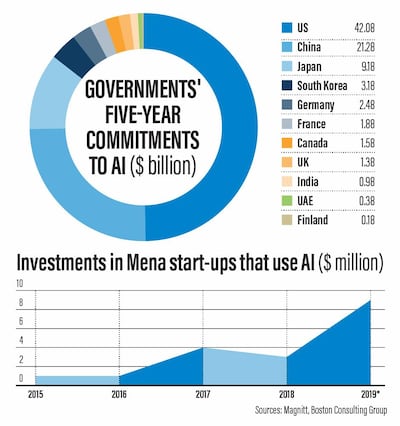The UAE is rolling out its biggest effort yet to develop a workforce versed in artificial intelligence, as the rapidly-advancing technology transforms economies worldwide.
The Mohamed bin Zayed University of Artificial Intelligence (MBZUAI), a new graduate-level AI research institution in Abu Dhabi, is accepting applications for its first masters and PhD programmes this month, with classes scheduled to begin in September 2020.
As the first university to have a singular focus on AI, the institution aims to attract students from around the world to advance the technology and propel the UAE’s economic diversification efforts.
To compete with more than a hundred graduate degree programmes in AI – mainly in North America, China and the UK – MBZUAI is offering full scholarships, monthly stipends, health insurance and accommodation to all students.
MBZUAI is named after Sheikh Mohamed bin Zayed, Crown Prince of Abu Dhabi and Deputy Supreme Commander of the UAE Armed Forces, who believes in the transformative power of knowledge and scientific thinking.
Artificial intelligence and machine learning, a subset of AI, are gaining leaps forward in mimicking human thinking – creating the building blocks for automatic systems that can be improved through experience and data. As the technology evolves, applications for autonomous vehicles, robotics, data mining and precision medicine, among others, are taking off and creating lucrative opportunities.
AI is expected to add 14 per cent to the world’s gross domestic product by 2030, equivalent to $15.7 trillion (Dh57.7tn), according to business consultancy PwC. Experts estimate that AI’s contribution to the UAE economy will match the global increase of 14 per cent – the largest GDP share in the Middle East – in the same time frame. The country ranks 19th worldwide on the government AI readiness index, first in the region, according to Oxford Insights.
“The invention of electricity, the railroad, smartphones all transformed the world as we knew it. AI can lead to an ever-greater societal and economic transformation,” said Dr Sultan Al Jaber, Minister of State and chairman of the MBZUAI board of trustees.
Talent and academic institutions are essential, he said. “The Mohamed bin Zayed University of Artificial Intelligence is an open invitation from Abu Dhabi to the world to unleash AI’s full potential.”
The university was officially launched on Wednesday at its campus in Masdar City.
The UAE was among the first nations to see an opportunity in AI for its economy. In 2017, the government rolled out an AI strategy, dubbed UAE 2031, outlining plans to use the technology to make governance more efficient and naming eight sectors it aims to transform including space, renewable energy, water and education. The country also appointed the world's first Minister of State for Artificial Intelligence, Omar Al Olama. Mr Al Olama was present at the launch on Wednesday, alongside Dr Ahmad Belhoul Al Falasi, Minister of State for Higher Education and Advanced Skills, and Sheikh Mohammad Bin Hamad Bin Tahnoon Al Nahyan, Chairman of Abu Dhabi Airports. Mr Al Olama and Dr Al Falasi are also members of the university's advisory board.
"You're seeing the AI race emerge, with more than 20 national strategies. Countries are saying we need to lead and not be playing catch-up on this opportunity," Faisal Hamady, principal at Boston Consulting Group, told The National. "It's a bit of a positioning game."
The money governments are investing is primarily going into research and development, workforce training, data infrastructure and governance, as well as helping start-ups grow, Mr Hamady said.
Start-up data aggregator Magnitt counts 128 Mena start-ups on its platform that use AI. Of those, 52 are based in the UAE.
Combined, these 128 start-ups have raised $18 million to date, according to Magnitt, indicating that the application of AI is still in the early stages. However, half of the amount was raised within this year, which might point to an upward trend, Sietse van de Kerkhof, a venture capital data manager at Magnitt, told The National.
“Aside from certain hotspots around the world, like the US and China, pure AI research is rare,” Mr van de Kerkhof said.
With the opening of MBZUAI, AI research will be both common and local in the UAE.
The university's founding board of trustees comprise leaders in the field. They include MBZUAI interim president, Professor Michael Brady, who teaches oncological imaging at the University of Oxford; Prof Anil Jain, a lecturer at Michigan State University; Dr Kai-Fu Lee, a technology executive and venture capitalist based in Beijing; and Prof Daniela Rus, director of Massachusetts Institute of Technology's Computer Science and Artificial Intelligence Laboratory, Professor Andrew Chi-Chih Yao, Dean of the Institute for Interdisciplinary Information Sciences at Tsinghua University in Beijing and Peng Xiao, CEO of Group 42.
MBZUAI has partnered with the Abu Dhabi-based Inception Institute of Artificial Intelligence (IIAI), an applied research lab, to supervise PhD students and curriculum development. IIAI will also serve as a principal partner for collaborative research.
The university will offer master of science and PhD programmes in three of the fastest-growing areas of AI: machine learning, computer vision and natural language processing.
"Following decades of research into machine learning and artificial intelligence, we are now at a turning point in the widespread application of advanced intelligence. That evolution is – among other things – creating exciting new career opportunities in nearly every sector of society," said Prof Brady, interim president of MBZUAI.



















